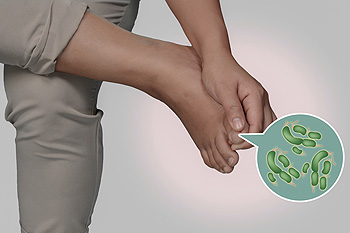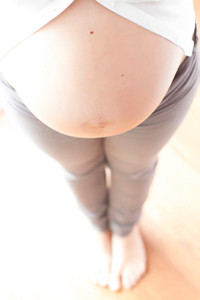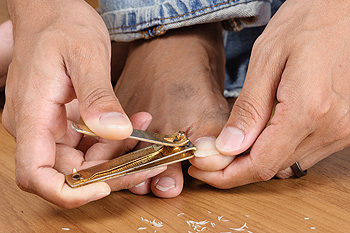
 The obvious symptoms that are associated with athlete’s foot is mild to severe itching, especially between the toes. This uncomfortable condition is caused by a fungus that is known as trichophyton, and thrives in warm and moist areas, which may include the inside of shoes or socks. Additionally, this contagious fungus may live in public pools, locker rooms and surrounding areas, and it is suggested to wear appropriate shoes if you are in these places. Patients who have severe cases of athlete's’ foot may experience red, flaky, and cracked skin on the side and soles of the feet, and in extreme cases, blisters and swelling may develop. If you have become afflicted with these symptoms, it is suggested to seek the counsel of a podiatrist who can perform a correct diagnosis and proper treatment options can be discussed.
The obvious symptoms that are associated with athlete’s foot is mild to severe itching, especially between the toes. This uncomfortable condition is caused by a fungus that is known as trichophyton, and thrives in warm and moist areas, which may include the inside of shoes or socks. Additionally, this contagious fungus may live in public pools, locker rooms and surrounding areas, and it is suggested to wear appropriate shoes if you are in these places. Patients who have severe cases of athlete's’ foot may experience red, flaky, and cracked skin on the side and soles of the feet, and in extreme cases, blisters and swelling may develop. If you have become afflicted with these symptoms, it is suggested to seek the counsel of a podiatrist who can perform a correct diagnosis and proper treatment options can be discussed.
Athlete’s Foot
Athlete’s foot is often an uncomfortable condition to experience. Thankfully, podiatrists specialize in treating athlete’s foot and offer the best treatment options. If you have any questions about athlete’s foot, consult with Dr. Robert Hope from Riverside Podiatry. Our doctor will assess your condition and provide you with quality treatment.
What Is Athlete’s Foot?
Tinea pedis, more commonly known as athlete’s foot, is a non-serious and common fungal infection of the foot. Athlete’s foot is contagious and can be contracted by touching someone who has it or infected surfaces. The most common places contaminated by it are public showers, locker rooms, and swimming pools. Once contracted, it grows on feet that are left inside moist, dark, and warm shoes and socks.
Prevention
The most effective ways to prevent athlete’s foot include:
Symptoms
Athlete’s foot initially occurs as a rash between the toes. However, if left undiagnosed, it can spread to the sides and bottom of the feet, toenails, and if touched by hand, the hands themselves. Symptoms include:
Diagnosis and Treatment
Diagnosis is quick and easy. Skin samples will be taken and either viewed under a microscope or sent to a lab for testing. Sometimes, a podiatrist can diagnose it based on simply looking at it. Once confirmed, treatment options include oral and topical antifungal medications.
If you have any questions, please feel free to contact our office located in Tuscaloosa, and Fayette, AL . We offer the newest diagnostic and treatment technologies for all your foot care needs.
Read more about How to Deal with Athlete's Foot
 When a woman discovers she is pregnant, there are many changes that normally take place over the next nine months and thereafter. Experiencing foot pain during pregnancy is common, and this can produce discomfort while standing. Swelling may accompany foot pain, which may make it difficult to perform daily tasks. There may be several reasons why foot pain may be apparent during pregnancy, including extra pressure the feet must endure from the additional weight gain, a natural change in posture as a result of the center of gravity shifting in the body, in addition to the blood becoming thicker, possibly causing uncomfortable foot cramps. There may be gentle exercises that can be performed, which may provide the desired relief from pregnancy foot pain. Additionally, drinking plenty of fresh water, limiting salt intake, and eating a balanced diet may aid in the reduction of foot pain that is associated with pregnancy. If you would like additional information about techniques that may avoid foot pain during this time in your life, it is advised to speak with a podiatrist.
When a woman discovers she is pregnant, there are many changes that normally take place over the next nine months and thereafter. Experiencing foot pain during pregnancy is common, and this can produce discomfort while standing. Swelling may accompany foot pain, which may make it difficult to perform daily tasks. There may be several reasons why foot pain may be apparent during pregnancy, including extra pressure the feet must endure from the additional weight gain, a natural change in posture as a result of the center of gravity shifting in the body, in addition to the blood becoming thicker, possibly causing uncomfortable foot cramps. There may be gentle exercises that can be performed, which may provide the desired relief from pregnancy foot pain. Additionally, drinking plenty of fresh water, limiting salt intake, and eating a balanced diet may aid in the reduction of foot pain that is associated with pregnancy. If you would like additional information about techniques that may avoid foot pain during this time in your life, it is advised to speak with a podiatrist.
Pregnant women with swollen feet can be treated with a variety of different methods that are readily available. For more information about other cures for swollen feet during pregnancy, consult with Dr. Robert Hope from Riverside Podiatry. Our doctor will attend to all of your foot needs.
What Foot Problems Can Arise During Pregnancy?
One problem that can occur is overpronation, which occurs when the arch of the foot flattens and tends to roll inward. This can cause pain and discomfort in your heels while you’re walking or even just standing up, trying to support your baby.
Another problem is edema, or swelling in the extremities. This often affects the feet during pregnancy but tends to occur in the later stages.
How Can I Keep My Feet Healthy During Pregnancy?
If you have any questions please feel free to contact our office located in Tuscaloosa, and Fayette, AL . We offer the newest diagnostic and treatment technologies for all your foot needs.
Read more about Foot Care for Pregnant Women The importance of implementing daily foot care may be crucial to the overall health of the body. It may be easy to overlook the simple care the feet desire when poorly fitting shoes are worn, in addition to the feet possibly being enveloped in tight and sweaty socks for most of the day. The feet endure the weight from the entire body and may become injured as a result of the impact from daily walking. Research has shown the feet will generally feel better when they are washed and dried daily, followed by utilizing a good moisturizer, especially in the winter months. Shoes that are chosen should feel comfortable when they are initially tried on and shoes that do not have adequate arch support should be avoided. Additionally, there are conditions that may affect your feet, including diabetes, pregnancy, and the aging process and it is beneficial to consult with a podiatrist to discuss the changes in foot structure that may occur.
The importance of implementing daily foot care may be crucial to the overall health of the body. It may be easy to overlook the simple care the feet desire when poorly fitting shoes are worn, in addition to the feet possibly being enveloped in tight and sweaty socks for most of the day. The feet endure the weight from the entire body and may become injured as a result of the impact from daily walking. Research has shown the feet will generally feel better when they are washed and dried daily, followed by utilizing a good moisturizer, especially in the winter months. Shoes that are chosen should feel comfortable when they are initially tried on and shoes that do not have adequate arch support should be avoided. Additionally, there are conditions that may affect your feet, including diabetes, pregnancy, and the aging process and it is beneficial to consult with a podiatrist to discuss the changes in foot structure that may occur.
Everyday foot care is very important to prevent infection and other foot ailments. If you need your feet checked, contact Dr. Robert Hope from Riverside Podiatry. Our doctor can provide the care you need to keep you pain-free and on your feet.
Everyday Foot Care
Often, people take care of their bodies, face and hair more so than they do for their feet. But the feet are a very important aspect of our bodies, and one that we should pay more attention to. Without our feet, we would not be able to perform most daily tasks.
It is best to check your feet regularly to make sure there are no new bruises or cuts that you may not have noticed before. For dry feet, moisturizer can easily be a remedy and can be applied as often as necessary to the affected areas. Wearing shoes that fit well can also help you maintain good foot health, as well as making it easier to walk and do daily activities without the stress or pain of ill-fitting shoes, high heels, or even flip flops. Wearing clean socks with closed shoes is important to ensure that sweat and bacteria do not accumulate within the shoe. Clean socks help to prevent Athlete’s foot, fungi problems, bad odors, and can absorb sweat.
If you have any questions please feel free to contact our office located in Tuscaloosa, and Fayette, AL . We offer the newest diagnostic and treatment technologies for all your foot needs.
Read more about Everyday Foot Care A painful and uncomfortable condition that is known as plantar warts will typically affect the heel of the foot. It appears as a small, thickened area with tiny black dots in the center, and may generally cause severe pain while walking. Most warts extend outward from the skin, but this wart grows inward as a result of the pressure the heel endures from walking for most of the day. Plantar warts are known to be caused by the human papillomavirus (HPV) and is extremely contagious. This type of virus thrives in warm and moist places, often including pools, locker rooms, and surrounding areas. Research has shown that it may enter the body through tiny cracks in the skin of the heel area. Measures can be implemented that may prevent this virus from attacking the body, which may include wearing appropriate shoes in public shower areas, and avoid sharing towels, shoes, or socks. If you feel you have developed this ailment, it is suggested to speak with a podiatrist to discuss proper treatment options.
A painful and uncomfortable condition that is known as plantar warts will typically affect the heel of the foot. It appears as a small, thickened area with tiny black dots in the center, and may generally cause severe pain while walking. Most warts extend outward from the skin, but this wart grows inward as a result of the pressure the heel endures from walking for most of the day. Plantar warts are known to be caused by the human papillomavirus (HPV) and is extremely contagious. This type of virus thrives in warm and moist places, often including pools, locker rooms, and surrounding areas. Research has shown that it may enter the body through tiny cracks in the skin of the heel area. Measures can be implemented that may prevent this virus from attacking the body, which may include wearing appropriate shoes in public shower areas, and avoid sharing towels, shoes, or socks. If you feel you have developed this ailment, it is suggested to speak with a podiatrist to discuss proper treatment options.
Plantar warts can be very uncomfortable. If you need your feet checked, contact Dr. Robert Hope from Riverside Podiatry. Our doctor will assist you with all of your foot needs.
About Plantar Warts
Plantar warts are the result of HPV, or human papillomavirus, getting into open wounds on the feet. They are mostly found on the heels or balls of the feet.
While plantar warts are generally harmless, those experiencing excessive pain or those suffering from diabetes or a compromised immune system require immediate medical care. Plantar warts are easily diagnosed, usually through scraping off a bit of rough skin or by getting a biopsy.
Symptoms
Treatment
To help prevent developing plantar warts, avoid walking barefoot over abrasive surfaces that can cause cuts or wounds for HPV to get into. Avoiding direct contact with other warts, as well as not picking or rubbing existing warts, can help prevent the further spread of plantar warts. However, if you think you have developed plantar warts, speak to your podiatrist. He or she can diagnose the warts on your feet and recommend the appropriate treatment options.
If you have any questions please feel free to contact our office located in Tuscaloosa, and Fayette, AL . We offer the newest diagnostic and treatment technologies for all your foot needs.
Read more about All About Plantar Warts